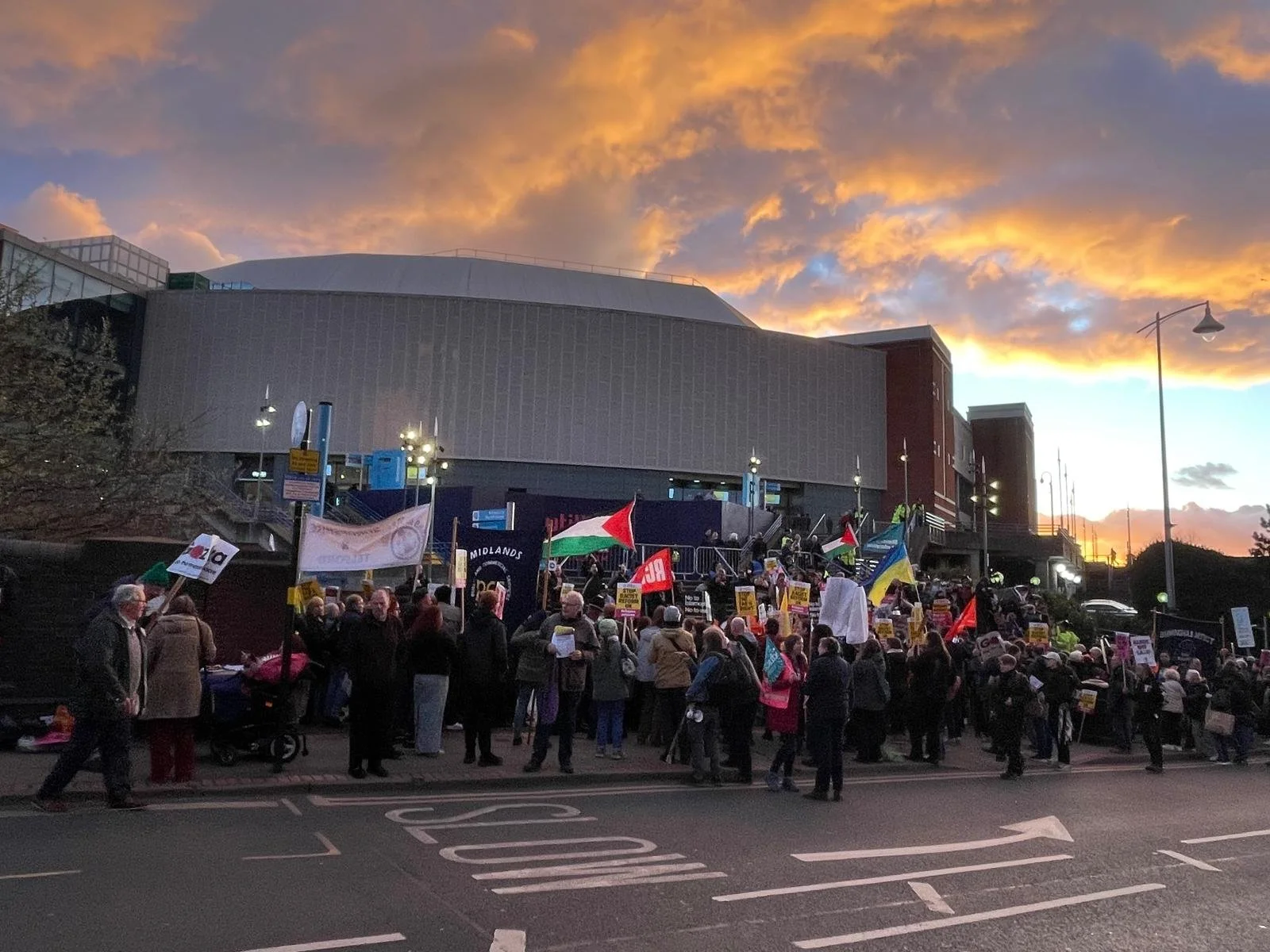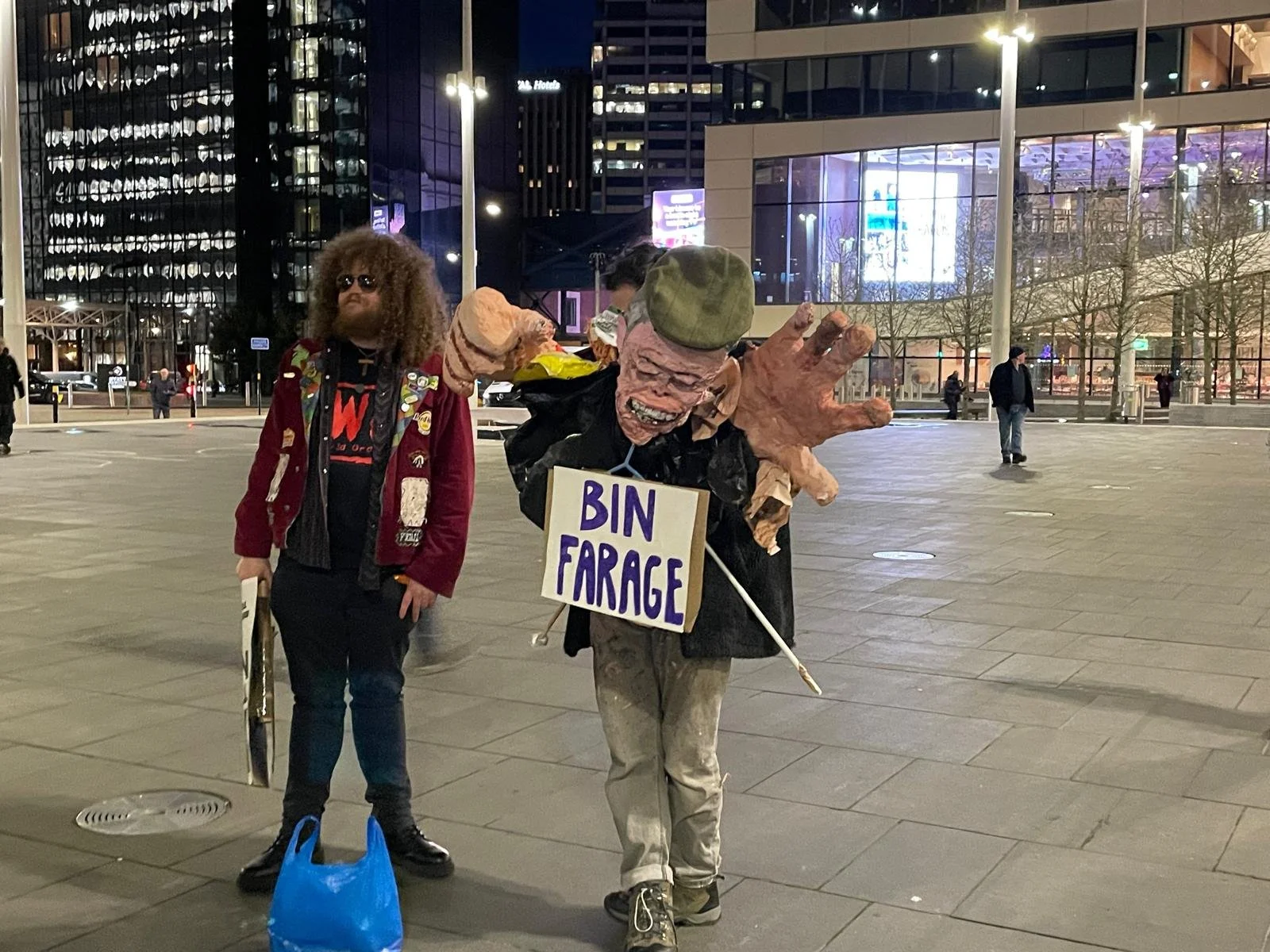Birmingstrong: Resistance, Rhythm & Solidarity Against Racist Reform UK
On 29 March 2025, under Birmingham’s heavy grey skies, something powerful stirred—a refusal to remain silent in the face of rising populism and far-right racism. It wasn’t just another protest. It was a declaration—a fusion of memory, defiance, and vision, all braided into one pivotal moment. Over 500 people—trade unionists, anti-racist campaigners, artists, climate justice activists, and residents from across Birmingham—came together to oppose Nigel Farage and the far-right platform of Reform UK. They were joined by a coachload from Leicester, supporters from London, and messages of solidarity from across Britain. What unfolded that day was not merely resistance—it was the building of an alternative.
Nigel Farage, with his usual bluster, had claimed that his rally at the Utilita Arena would be “the biggest political rally in modern history.” He promised a populist uprising. But what he encountered instead was a wall of people, a wall of sound, a wall of conviction. The Birmingham protest—militant, creative, and defiant—forced a 45-minute delay to the start of the Reform rally. Protesters chanted passionately, voicing sharp, inventive slogans accompanied by drummers: “Nigel Farage, you racist scum… kick the racists out of Brum!”, “We know we will win… put the racist in the bin!”, and “Nigel Farage, kiss my arse… you’re just a puppet of the ruling class!” Their voices, amplified through a powerful PA system and a sea of megaphones, surrounded the arena with noise and clarity. Reform supporters were visibly rattled, their entry blocked and delayed, as the rhythm of resistance drowned out the orchestration of Farage’s spectacle.
Inside the Arena, Farage made his entrance atop a pick-up truck—choreographed, some said, with eerie echoes of Nazi Nuremberg rallies—while music blared and spotlights swept the crowd. His speech followed a now-familiar script: blame migrants, demonise Muslims, deny the climate crisis, and promise salvation through division. But outside, Birmingham spoke back. And it spoke with more than words—it spoke with presence, unity, and history.
Organising the Resistance
This wasn’t a protest born overnight. For six weeks, Birmingham’s anti-racist and progressive organisations met weekly to plan the response. Stand Up to Racism Birmingham, Kings Heath United Against Racism, the Birmingham Race Impact Group, the Birmingham Climate Justice Coalition, and others gathered under the banner Birmingham United Against Racism. They worked with urgency and purpose—mobilising networks, holding public meetings, flooding neighbourhoods with leaflets and posters, and launching daily social media campaigns that carried the message far beyond the city’s borders.
A public meeting on 25 March, held at the BRIG Café—a hub of community resistance—aimed to build momentum for the anti-Reform protest and rally while connecting broader struggles. Speakers echoed the call for the labour movement to become the moral engine of this resistance, grounded in anti-racism, climate justice, and international solidarity, particularly in support of the heroic struggle of the Palestinian people. People came not just to oppose Farage, but to connect movements—from anti-fascism to climate justice—sharing stories, strategies, and songs. What emerged was not just an event, but a collective reaffirmation of the very values Farage and his allies sought to destroy: solidarity, mutual care, and internationalism.
The Unity Rally in Centenary Square was the heart of the day—a festival of resistance and a living testament to the world we could build if we stood together. The cultural richness of Birmingham was on full display. Music and poetry weren’t just entertainment—they were resistance. Birmingham’s foremost reggae ambassadors, Friendly Fire Band, brought heavy basslines and joyful defiance, including their anthem celebrating the city’s diversity, “It’s a Brum Ting.” Dalbir Singh led a diverse troupe of master musicians whose interwoven rhythms pulsed with ancestral power and spiritual defiance. Banner Theatre, one of the UK’s longest-standing and most steadfast political music theatre groups, performed “The Great Divide,” a powerful song drawing lines from the horrors of Dachau to the injustices of today. And Birmingham’s own Moqapi Selassie, a dub poet of fire and truth, ignited the crowd with words, sound, and power—cutting through the noise of hate with a message of Black pride, struggle, and unity.
Mukhtar Dar of Kings Heath United Against Racism and Tracy Abrahams hosted and compered the protest and Unity Rally, introducing a diverse range of speakers from across various movements. Salma Yaqoob, a seasoned anti-war and anti-racist campaigner, spoke powerfully about social inequality and the scapegoating of the poor by the rich. Martin Hoare, representing the Birmingham Trades Council, reminded the crowd that the labour movement has always had anti-fascism at its core. Naeem Malik of the Palestinian Solidarity Campaign connected local struggles to global injustices—particularly the fight against apartheid and settler colonialism in Palestine. Meanwhile, Rob Punton from Disabled People Against Cuts delivered a moving account of the devastating impact Reform UK’s plans would have on welfare provision and the NHS.
National SUTR organiser Samir Ali clearly laid out the political stakes: this is a fight for the soul of the country. Femi Oluwole, co-founder of Our Future Our Choice, detailed Nigel Farage's divisive political journey, exposing his harmful racist rhetoric. A message of international solidarity was read from Suresh Grover, a veteran of the Asian Youth Movements and one of the UK’s most ardent anti-racist organisers.
The Philosophy of Defiance
What happened in Birmingham was more than a rejection of Farage. It was a refusal of the global tide of hate, nationalism, and authoritarianism that seeks to sweep across borders. It was a refusal to accept the lie that austerity is caused by immigration. A refusal to accept that disabled people are a burden, that Muslims are a threat, and that migrants are a problem to be solved. It was a reminder of the lessons of history—that when populism and fascism are allowed to grow, it is always the most vulnerable who pay the price.
Reform UK is not unique. It is part of a global movement that includes Trumpism in the US, the BJP in India, Le Pen in France, and others. It uses the language of the people but serves the interests of the rich. It promises change, but delivers scapegoating, cuts, and cruelty. Its vision is death—the death of social care, climate stability, and human dignity. But the vision we fight for, as our predecessors did, is life—life in all its richness and diversity. What Birmingham offered was life and hope. It offered a different world—a world built on care, community, and courage. One where migrants are welcomed, not demonised. Where disability is met with support, not cuts. Where workers and the environment matter more than profits. Where art is not commodified, but radical. Where resistance is joyful, creative, diverse, and rooted in love as much as anger.
What Comes Next
But this was only the beginning. The far right is emboldened, funded, and organised. On 17 May, the fascist group Britain First plans to march through Birmingham. They will find the same answer that Farage did: you shall not pass – ¡No pasarán! Successive governments—both Labour and Tory—have paved the way for this rise, using state-sanctioned racism to legitimise and normalise far-right ideologies, gradually bringing them from the fringes into the mainstream. This movement must now expand, not only in size but in depth, to challenge state-sanctioned racism, street racism, and fascism. It must reach into every community, every workplace, every school, and every street. Trade unions must become more than negotiators—they must become defenders of democracy. Anti-racism must become central to the climate movement, the disability rights movement, and the labour movement. Because all these struggles are connected. Fascism thrives when we are divided, but it dies when we are united.
We walk in the footsteps of those who fought before us—people like Aijaz Kaleem, founder of the Pakistani Workers Association; Jagmohan Joshi and Avtar Jouhl, founders of the Indian Workers Association; Shirley Joshi, a key figure in the Birmingham Campaign Against Racism and Fascism; Stuart Hall, a founding figure of the University of Birmingham’s Centre for Contemporary Cultural Studies, whose work on race, identity, and the media profoundly influenced anti-racist movements; and Jewish activists like Maurice Ludmer, who was part of the 'Co-ordinating Committee Against Racial Discrimination' (CCARD). These pioneers of resistance showed us that solidarity, activism, and a deep commitment to justice are the antidotes to the poison of racism, fascism, and imperialism. Their legacy continues to inspire and guide us in the fight against all forms of oppression.
Let the Unity Rally not be a memory, but a spark. Let it light the path paved by those who came before us, a path that we now walk forward on as we build—not only resistance but renewal. Because the world that the racist Reform UK and fascist Britain First offer us is one of decay and despair. And the world we are building is one of justice, imagination, and hope. Let Birmingham’s stand be a warning to the far right—and a signal to the rest of us: another world is not only possible; it is already being built.
Join us.
You can watch coverage of the Unity Rally, here.




















